
Identify Your Niche
Choosing the right niche is essential for successful affiliate marketing. Focus on identifying your target audience and what they need. This allows you to create tailor-made content and promotions that resonate with them. Think about:
- Your product offerings
- Your customers’ interests
- Current market trends
Understanding these aspects will let you align your marketing efforts effectively.
Choose the Right Affiliate Partners
Selecting affiliates that align with your brand values is key. Look for partners who share your target audience and have a good reputation. Some criteria to consider include:
- Relevance: Ensure their audience matches your target market.
- Trustworthiness: Verify their credibility and past performance.
- Engagement: Evaluate how well they interact with their audience.
Consider reaching out to potential affiliates and discussing mutual benefits. This builds strong relationships that can be fruitful for both parties.
Offer Competitive Commissions
To attract quality affiliates, offer an appealing commission structure. While it’s important not to overspend, competitive rates can encourage affiliates to promote your products more aggressively. Here are some ideas:
- Flat-rate commissions for each sale.
- Tiered commissions for affiliates who achieve higher sales volumes.
- Recurring commissions for subscription-based services.
Clearly communicate your commission structure to affiliates to ensure transparency.
Leverage Multiple Marketing Channels
Don’t limit your affiliate marketing to one channel. Diversifying your marketing efforts can expand your reach significantly. Some common channels include:
- Social Media: Platforms like Instagram and Facebook provide great visibility.
- Blogging: Content marketing can drive traffic to your affiliate links.
- Email Marketing: Send newsletters to your subscribers about deals and promotions.
- Webinars and Live Events: They can help engage your audience directly.
Experiment with different channels to see which works best for your business.
Provide Quality Promotional Materials
To help affiliates succeed, furnish them with high-quality promotional materials. This includes:
- Banner ads in various sizes.
- Product images and descriptions.
- Email templates for newsletters.
- Social media graphics for seamless sharing.
Quality materials not only help your affiliates but also enhance your brand image.
Utilize Tracking and Analytics
Tracking sales and leads is essential for understanding your affiliate program’s success. Use tracking tools to analyze metrics such as:
| Metric | Importance |
|---|---|
| Click-Through Rate | Measures the effectiveness of your affiliate links. |
| Conversion Rate | Indicates how many clicks turn into actual sales. |
| Customer Acquisition Cost | Assess how much you’re spending to acquire new customers through affiliates. |
Use this data to make informed adjustments to your strategy and improve overall effectiveness.
Build Long-Term Relationships
Affiliate marketing can be a lucrative long-term partnership. Regular communication with your affiliates can foster loyalty and encourage better sales. Consider:
- Sending regular updates on products and promotions.
- Providing performance feedback to help affiliates improve.
- Rewarding consistent performers with bonuses or additional commissions.
Building these relationships ensures that your affiliates are motivated to push your products more enthusiastically.
For further insights and support on affiliate marketing, check out resources from Affilorama or explore Shopify’s Affiliate Guide. These resources can offer additional tools and tips to elevate your marketing strategy.
Implementing these effective strategies can significantly enhance your affiliate marketing for small businesses. With careful planning and execution, you can expand your reach, increase your revenue, and engage effectively with your audience.
Top Affiliate Programs Tailored for Local Small Enterprises
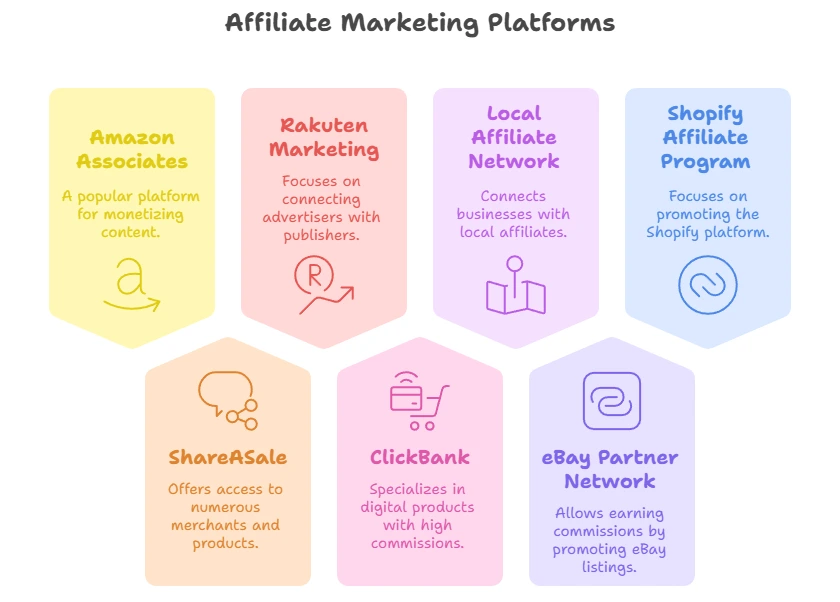 Affiliate marketing can be a game changer for local small businesses. It allows these enterprises to expand their reach by leveraging the power of online marketing without the need for a large advertising budget. Here’s a look at some of the top affiliate programs that are tailored specifically for local small businesses.
Affiliate marketing can be a game changer for local small businesses. It allows these enterprises to expand their reach by leveraging the power of online marketing without the need for a large advertising budget. Here’s a look at some of the top affiliate programs that are tailored specifically for local small businesses.
Amazon Associates
One of the most well-known affiliate programs, Amazon Associates, allows small businesses to earn commissions by promoting Amazon products. If you have a blog or website that caters to your local audience, you can link to relevant Amazon products. This can be particularly effective for local retail shops that wish to offer additional products to their customers.
ShareASale
ShareASale is a popular affiliate marketing network that connects small businesses with affiliates who can promote their products or services. Its vast number of merchants includes artisans, small retail stores, and local service providers. With ShareASale, you can easily find affiliates who align with your brand values and target audience.
Rakuten Marketing
Rakuten Marketing provides a global affiliate network that is beneficial for small businesses looking to scale. Local businesses can use Rakuten to connect with influencers and affiliates that can promote their offerings in their communities. The analytics tools available help you measure your performance effectively.
ClickBank
If you’re a local business that offers digital products or services, ClickBank is an excellent affiliate program to consider. It specializes in digital goods and offers high commission rates, making it ideal for small entrepreneurs who want to tap into the digital landscape.
Local Affiliate Networks
There are various local affiliate networks specifically geared toward small businesses. Participating in these programs can help you connect with affiliates who understand your local market. Some options to explore include:
eBay Partner Network
The eBay Partner Network offers a unique opportunity for small businesses to drive sales through auctions and listings. By promoting eBay products relevant to your local audience, you can earn commissions on referrals. This is especially useful for niche products that may not be available locally.
Shopify Affiliate Program
For small businesses in retail, the Shopify Affiliate Program allows you to earn money by promoting Shopify services. As more small businesses shift to eCommerce, this program can be a great support by guiding others to start their own online stores.
Benefits of Affiliate Marketing for Local Small Businesses
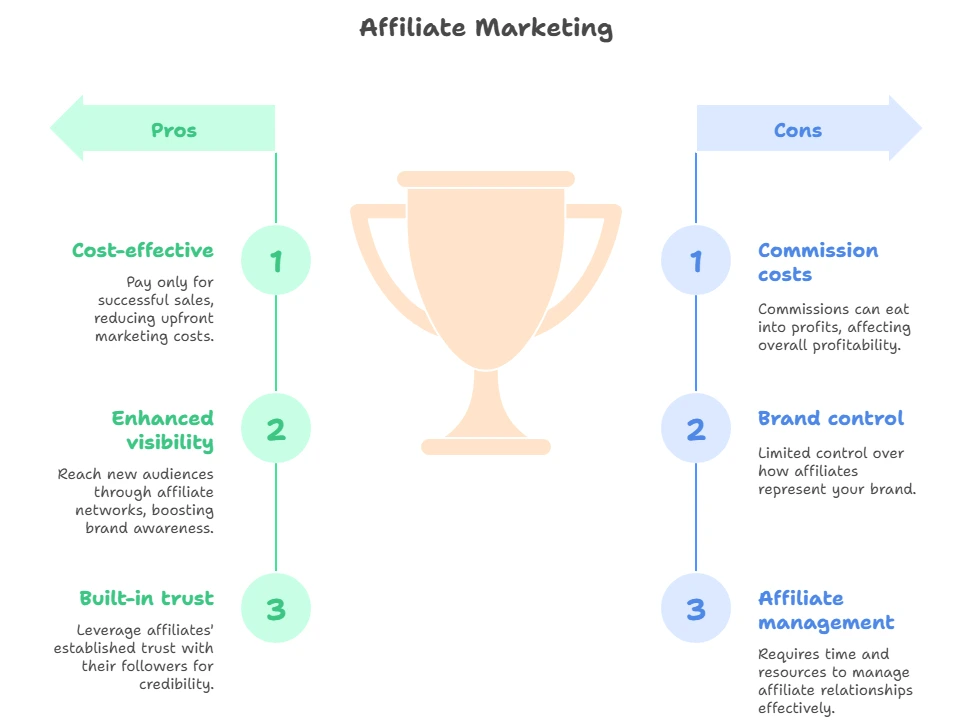
Engaging in affiliate marketing provides numerous advantages:
- Cost-effective: You only pay commissions on actual sales.
- Enhanced Visibility: Affiliates will introduce your brand to new customers.
- Built-in Trust: Affiliates often come with a loyal follower base.
How to Get Started with Affiliate Marketing
- Choose your niche and target audience. Understand what products or services resonate with your local customers.
- Sign up for one or more of the affiliate programs listed above. Make sure to read their terms and conditions.
- Create high-quality content that showcases the affiliate products. Blogging, social media posts, and emails can all be effective.
- Track your performance and adjust your strategies accordingly. Most affiliate programs offer dashboards with analytics.
Affiliate marketing can propel local small businesses forward by increasing sales and enhancing online visibility. By selecting the right programs and strategically promoting products, you can create a sustainable revenue stream that complements your existing business model.
Building Strong Relationships with Affiliate Partners
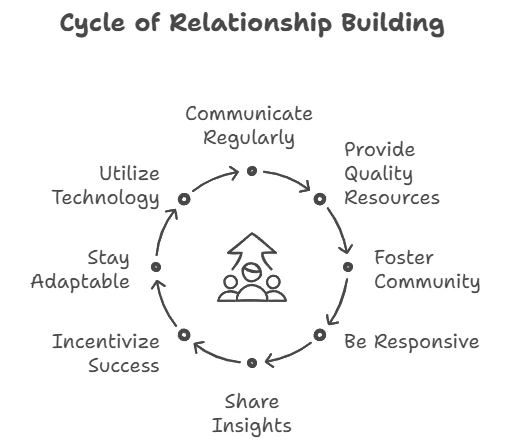
Building strong relationships with affiliate partners is essential for small businesses looking to enhance their online visibility and increase revenue. These relationships form the backbone of a successful affiliate marketing strategy, leading to mutual growth and trust. Here are some practical steps you can take to build and maintain strong connections with your affiliate partners.
Communicate Regularly
Effective communication is vital in any partnership. Ensure that you establish regular channels of communication with your affiliates. This can be through:
- Email updates about promotions and new products.
- Regular check-ins via video calls or phone calls to discuss strategies.
- Feedback sessions to understand their needs better.
Keep your affiliates informed about any changes in your products or marketing strategies. This transparency helps build trust and encourages them to promote your brand more effectively.
Provide Quality Resources
Equip your affiliate partners with high-quality resources that they can use to promote your products or services. Effective tools include:
- Banners and logos that reflect your brand identity.
- Product images and videos to aid in their promotions.
- Pre-written content or promotional materials they can use.
By providing these resources, you make it easier for affiliates to market your offerings, leading to more successful campaigns and higher conversions.
Foster a Sense of Community
Creating a sense of community can significantly enhance your relationship with affiliates. Consider organizing events, either online or offline, where partners can engage with each other. This could include:
- Webinars discussing the latest marketing trends.
- Networking sessions to share experiences and best practices.
- Incentive programs to reward top-performing affiliates.
This approach not only helps partners feel valued, but it also encourages collaboration and the sharing of ideas, which benefit everyone involved.
Be Responsive
When your affiliates have questions or concerns, be quick to respond. A responsive affiliate program shows that you value their efforts and are willing to support them. This can lead to:
- A more productive working relationship.
- Increased motivation for affiliates to promote your products.
- A better understanding of the challenges they face.
Make it a point to establish a dedicated support team to handle affiliate queries and needs promptly. A reliable support system can differentiate your program from others in a competitive marketplace.
Share Performance Insights
Providing affiliates with data regarding their performance can empower them to optimize their strategies. Share information such as:
- The number of clicks generated from their unique affiliate links.
- Conversion rates for each affiliate.
- Insights into which products are performing best.
This level of transparency allows affiliates to see the impact of their efforts, encouraging them to refine their marketing tactics and ultimately drive more sales.
Incentivize Success
Recognizing and rewarding the hard work of your affiliates can take your relationship to new heights. Consider implementing an incentivization structure, such as:
- Performance bonuses for top affiliates.
- Increasing commission rates based on sales goals.
- Exclusive access to new products for dedicated affiliates.
By rewarding success, you’re not just motivating affiliates; you’re also reinforcing their commitment to your brand.
Stay Adaptable
The landscape of affiliate marketing is ever-evolving. Stay adaptable and open to new ideas or changes that your affiliates suggest. Listen to their feedback and be willing to modify your affiliate program based on their experiences. Doing so will foster a sense of partnership, where both sides feel valued and empowered.
Utilizing Technology
Leverage technology to manage your affiliate relationships efficiently. Platforms like Refersion and Impact can help streamline your processes, from tracking affiliate performance to managing payouts. These tools can help maintain transparency and efficiency, which is crucial for a thriving affiliate partnership.
Building strong relationships with affiliate partners doesn’t happen overnight. It takes consistent effort, communication, and a willingness to adapt. With improved relationships, your affiliates are more likely to represent your brand passionately, driving sales and enhancing your business’s overall success.
Assessing the ROI of Affiliate Marketing Campaigns
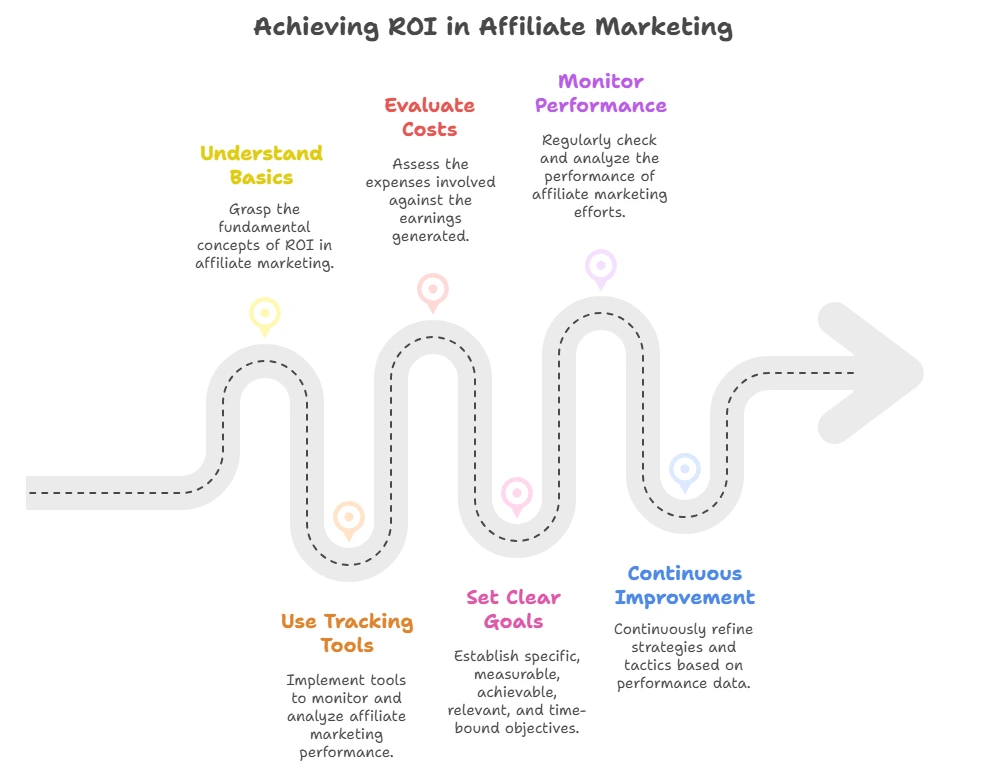
Affiliate marketing has become a popular strategy for businesses looking to expand their reach and drive sales. Assessing the return on investment (ROI) from your affiliate marketing campaigns is crucial for understanding their effectiveness. It tells you whether your efforts are yielding results and helps inform future strategies. Here’s how to accurately assess the ROI of your affiliate marketing initiatives.
Understanding the Basics of ROI in Affiliate Marketing
ROI is a simple yet powerful measure that enables you to understand how profitable your affiliate marketing is in relation to what you spend. The formula to calculate ROI is:
$$ \text{ROI} = \frac{\text{Net Profit}}{\text{Cost of Investment}} \times 100 $$
When assessing your affiliate marketing ROI, it’s essential to consider various metrics to get a complete picture. Here are key factors to keep in mind:
- Affiliate Commissions: These are payments made to affiliates based on the sales they generate. Knowing this helps you gauge the effectiveness of your affiliate partners.
- Traffic Generated: Track the number of visitors directed to your site via affiliate links. More traffic could lead to higher conversions.
- Conversion Rate: This metric indicates what percentage of visitors took action (like making a purchase). A higher conversion rate signifies a successful campaign.
- Customer Lifetime Value (CLV): Understanding how much a customer will spend over time helps justify initial affiliate commissions.
- Ad Spend: If you are running ads to promote your affiliate program, include those costs in your ROI calculations.
Tools for Tracking Affiliate Marketing ROI
To make your ROI assessment straightforward, using the right tools is essential. Here are some effective tools you can use:
- Google Analytics: Use this powerful tool to track traffic sources and conversions effectively.
- Affiliate Tracking Software: Platforms like Refersion and Post Affiliate Pro help you monitor affiliate activities and commissions.
- CRM Systems: Change and manage customer relationships to understand their buying habits and lifetime value better.
Each tool offers various features, so choose one that best fits your business needs. This will simplify your ROI monitoring process.
Evaluating Costs vs. Earnings
Another vital aspect of assessing your affiliate marketing ROI is understanding costs versus earnings. Here’s how you can break it down:
- Direct Costs: These include commissions to affiliates and advertising expenses directly related to the campaign.
- Indirect Costs: Think about time invested in managing the program and other resources spent on technology or administrative tasks.
- Earnings: Calculate the total sales generated through affiliate links. This should include gross sales before any returns or refunds.
Setting Clear Goals
Before launching an affiliate marketing campaign, establish measurable goals. Some typical goals may include:
- Increasing brand awareness
- Boosting sales by a specific percentage
- Attracting a certain number of new customers
Clear objectives help you measure your ROI accurately. Once goals are set, it can be beneficial to re-evaluate them periodically to adapt to market trends and ensure ongoing success.
Monitoring Performance Regularly
Regular monitoring ensures you keep a close eye on metrics that contribute to your ROI. Use your tracking tools and analytical software to conduct weekly or monthly performance reviews. This can help you quickly identify which affiliates are performing well and which need adjustments.
Continuous Improvement
After evaluating your ROI, use insights to improve your affiliate marketing strategies. Consider these approaches:
- Engage with Your Affiliates: Offer feedback and support to optimize their promotional strategies.
- Adjust Commission Structures: Experiment with different commission rates to motivate affiliates.
- Focus on High-Performing Channels: Invest more in the channels that yield higher returns.
Ultimately, assessing the ROI of your affiliate marketing campaigns is an ongoing process. It requires attention to detail, analysis, and flexibility to adapt to findings. For more detailed insights and further reading on this topic, you can explore resources like Smart Passive Income and Affiliate Programs.
By understanding your costs, earnings, and overall goals, you can significantly enhance the efficiency of your affiliate marketing efforts, potentially leading to impressive returns and business growth.
Common Mistakes to Avoid in Affiliate Marketing for Small Businesses
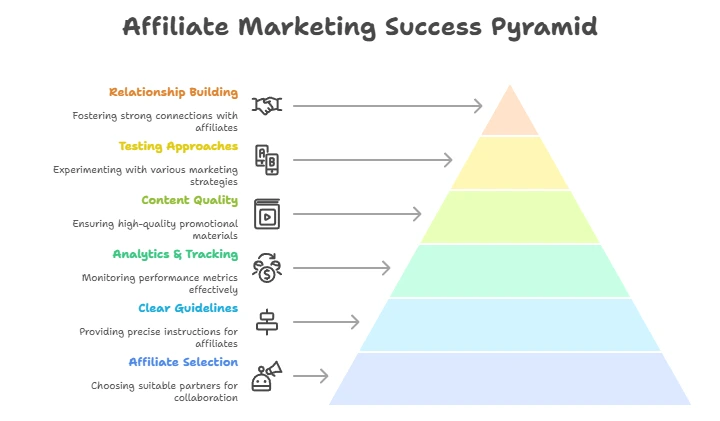
In the world of affiliate marketing, small businesses have a unique opportunity to expand their reach and boost sales. However, many stumble into pitfalls that can derail their efforts. Here are some common mistakes worth avoiding to make your affiliate marketing strategy efficient and rewarding.
Neglecting to Choose the Right Affiliates
One critical error small businesses make is partnering with the wrong affiliates. It’s essential to select affiliates who align with your brand values and target audience. Collaborating with irrelevant or untrusted affiliates can dilute your brand and lead to poor customer engagement.
Tips for Choosing Affiliates:
- Research their audience demographics.
- Evaluate their reputation in your niche.
- Look for affiliates who have experience in your industry.
Failing to Provide Clear Guidelines
Many small businesses assume that affiliates know how to represent their brand. However, this is rarely the case. Without clear guidelines, affiliates may create content that does not align with your messaging or brand image.
What to Include in Your Guidelines:
- Brand Voice: Specify the tone and style to use in content creation.
- Content Restrictions: Clearly outline what shouldn’t be said or promoted.
- Visual Assets: Provide logos, images, and other branding materials they can use.
Overlooking Analytics and Tracking
Many small business owners neglect to analyze the performance of their affiliate marketing programs. Without monitoring key metrics, it’s hard to determine what strategies are working. Utilize tracking tools to measure clicks, conversions, and commissions.
Key Metrics to Track:
| Metric | Description |
|---|---|
| Clicks | The number of times users click on affiliate links. |
| Conversion Rate | The percentage of visitors who make a purchase after clicking. |
| Commission Payouts | How much you pay your affiliates based on sales. |
Ignoring the Importance of Content Quality
A common mistake in affiliate marketing for small businesses is underestimating the importance of content quality. If your affiliates are producing low-quality content, it can reflect poorly on your business. Quality content enhances trust and drives conversions.
Encourage your affiliates to create authentic and valuable content that resonates with their audience. Great content can drive organic traffic and lead to higher conversion rates.
Not Testing Different Approaches
Another frequent error is sticking to one marketing strategy. Affiliate marketing thrives on experimentation. Don’t hesitate to test different approaches, whether it’s varying the promotional methods or changing the commission structure.
Testing Strategies to Consider:
- A/B testing different calls-to-action.
- Varying the types of content (blogs, videos, social media posts).
- Adjusting commission rates to see how it impacts affiliate engagement.
Neglecting to Build Relationships
Many small businesses forget that affiliate marketing is also about building relationships. Instead of treating affiliates as mere sales tools, invest time in fostering relationships. Engage with them, acknowledge their efforts, and provide feedback.
Strong relationships with affiliates often lead to better performance and loyalty. Consider hosting training sessions or networking events to keep lines of communication open.
Affiliate marketing can be a game-changer for small businesses when implemented correctly. By avoiding these common pitfalls, you can build successful partnerships with affiliates that drive traffic and increase sales. For more insights on how small businesses can thrive in affiliate marketing, check out Affiliate Marketer Training and explore guidance tailored to your specific needs.
Remember, focusing on collaboration, communication, and quality will significantly enhance your affiliate marketing efforts.
